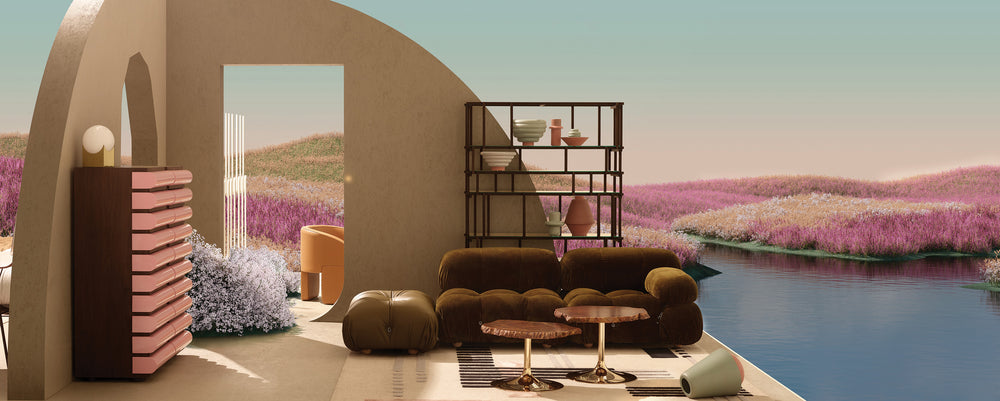
Working with Karie Soehardi Consultancy, Circular Design Thinking, Space is reviewing and measuring its carbon footprint, energy consumption and materials across supply chains. It's a journey that began with a full transport audit and the collection of product data across materials and brands. By understanding exactly what materials and finishes are being used to create all of its products, Space will be able to consciously source environmental options and create a flow-on effect for both industry and clients, and lay the foundations for a circular design methodology with net zero carbon emissions.

The Camaleonda sofa designed by Mario Bellini for B&B Italia in 1970 and relaunched in 2020 to allow the sofa to be dismantled, enabling all materials to have another life cycle, making the sofa's components an asset. Photo c/o B&B Italia
‘Working with the Space team and their international design brands, the sustainability journey began with a full transport audit and the collection of product data across materials and processes,’ remarks Karie Soehardi of Karie Soehardi Consultancy, Circular Design Thinking. ‘Measuring carbon emissions, evaluating materials and operational processes will lay the foundations for Space's goal of zero carbon emissions and a circular design methodology.’
As brands and manufacturers seek to understand their carbon footprint, energy consumption, ethics and materials across their supply chain and production processes, understanding exactly what materials and finishes are being used to create the products in their collections allow organisations to consciously source environmental options. It's that information that helps inform and guide suppliers to find alternative sustainable materials and end of life-cycle solutions, creating a flow-on affect for industry and consumers. Understanding what a product’s composition is and its method of manufacturing is part of a design's quality. Alternatives can then be discussed in-depth once materials are seen as an ‘ingredient’, and revealing the impact products have on the planet, people and business.

The classic Husk armchair from the Husk collection by Patricia Urquiola for B&B Italia is currently going through a full Life Cycle Assessment that looks at transport and energy emissions and estimated emissions in material sourcing and processing to establish its carbon footprint. Photo c/o B&B Italia.
‘Measuring carbon emissions, evaluating materials and operational processes will lay the foundations for Space's goal of zero carbon emissions and a circular design methodology.’
Karie Soehardi Consultancy, Circular Design Thinking

The Royce armchair by SP01 is being taken through its design paces as part of a full Life Cycle Assessment . Photo c/o SP01 Design.
In collaboration with Karie Soehardi Consultancy, Space has taken on the first milestone, establishing a carbon process map that is measuring and analysing the carbon output between the factory to origin port, destination port and warehouse to customer over one year. This research is focussing on increased consolidation and utilisation to enable a reduction in the frequency of smaller containers shipped by up to 33%, resulting in the reduction of carbon emissions and transportation costs. The next critical step willl involve the implementation of transport changes to fascilitate reduction, while securing high quality carbon credits for remainng carbon output to reach net zero by 2030.
At the same time, the Life Cycle Analysis of the Space collection involves a material audit, what Soehardi describes as a product’s ‘ingredients’, to identify the environmental standards and any hazardous elements, as well as the various certifications of each material across the design collection. Research is underway on the B&B Italia Husk chair and Camaleonda sofa, and the Royce char by SP01. This involves looking at transport and energy emissions and estimated emissions in material sourcing and processing to establish an estimated carbon footprint for each item. The iconic Cameleonda for example, was redesigned in 2020 to be dismantled enabling all materials to have another life cycle, so waste removed and repurposed makes the components of this sofa an asset.
This information forms the beginning of an accessible library of material details that will be constantly updated and shared with the team. Developing a material library will allow Space to ask in-depth questions of their suppliers and share knowledge during the designing process to benefit everyone. This first step forms part of a comprehensive data management plan that will become an important tool for product developers and buyers within Space’s wider organisation. Knowing the facts at every stage of a product’s development allows for informed decisions about products. These are the first stages of the journey for Space as it develops the baselines for its circular design methodology and goal of zero carbon emissions.

